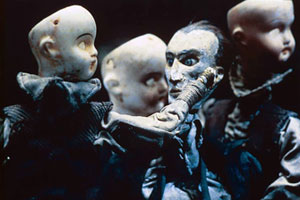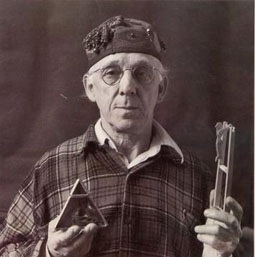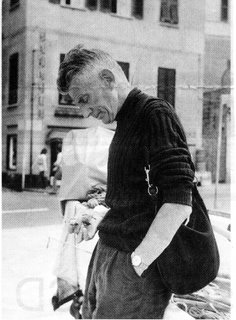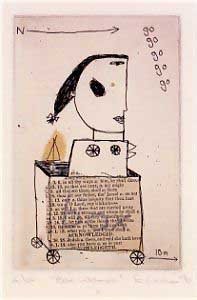The last 'official' day of the holidays. Torrential rain on the Velux as I type this. August?
*
New arrivals by post:
'if nobody speaks of remarkable things' & 'so many ways to begin' by Jon McGregor
'Lilith' & 'Phantastes' by George MacDonald.
*
"but the speaker always hiding behind his tuft, when I looked in his direction, "Look at him! Look at him! He has begun a story without a beginning, and it will never have any end. He! he! he! Look at him" ". ('Phantastes' p.24)
*
"Let it be by faith too. That there is an order; /words blotted out/ but "evolution", the magic whereby forms come /words blotted out/ mean works of art as forms, but I mean also /words blotted out/ that sense. The form of Hamlet or Lear or Desdemona /words blotted out/ And you and I are forms. The art is the area of /words blotted out/ being manifest. We're called up to dance. And damn the New Critics and the professors of Literature, what has that to do with the poem in itself ... (Robert Duncan, Letter 82)
... thinking of this passage as I pause mid-page of 'Phantastes' and Wagner's 'Das Rheingold' is still in my ears ... Alberich: Caliban ... Loge: Feste or the Fool in Lear ... Rheinmaidens and witches in Macbeth ... the triple daughters of King Lear ... the daughter as the price of land ... Freia & Cordelia ... C.S. Lewis' closing quotation to his introduction of 'Phantastes' "the thing more gold than gold" attributed to Sappho ... the opening of Piers Plowman and the dream of a Field ... Robert Graves' pages on the White Goddess ... the trees you can trust and those you must shun ... tree alphabets ... the massive hand pursuing the 'I' of MacDonald's text and Coleridge's Mariner & Wordsworth rowing on the lake ...
*
And the verdict on the holidays?
"too infrequent idle moments that permit idling".
(as Duncan complained, Letter 33)
*
And this will be the 'core' to this year's introductory poetry classes - with apologies to iPhil (if he's reading - Syd Barrrett as part of the syllabus!):
1.
Knock at the door (tap forehead)
Peep in (lift eyelid)
Lift the latch (press the nose)
Walk in (finger on the lips)
Take a chair (pinch cheek)
Sit by there (pinch the other cheek)
How-d’you-do-today-Sir? (tug the chin)
2.
Eye winker
Tom tinker
Nose smeller
Mouth eater
Chin chopper
Guzzlewhopper
3.
Thumb bold
Thibity-thold
Langman
Lick pan
Mamie’s wee man
4.
Thumb-he
Wizbee
Long Man
Cherry Tree
Little Jack-a-Dandy
5.
This little pig went to market
This little pig stayed at home
This little pig had roast beef
This little pig had none
And this little pig went wee-wee-wee all the way home
6.
Little Pig
Pillimore
Grimithistle
Pennywhistle
Great Big Thumbo, father of them all
7.
Tickly, tickly, on your knee
If you laugh you don’t love me!
8.
Round and round the garden
Like a teddy bear
One step, two step,
Tickly under there!
9.
Here is the church, and here is the steeple
Open the door and there are the people
Here is the parson going upstairs
And here he is a-saying his prayers
10.
Ring-a-ring o’roses
A pocket full of posies
A-tishoo! A-tishoo!
We all fall down
11.
Diddle diddle dumpling, my son John
Went to bed with his trousers on
One shoe off, and one shoe on
Diddle diddle dumpling, my son John
12.
Up the wooden hill
to Bedfordshire
Down Sheet Lane
to Blanket fair
13.
I see the moon
And the moon sees me
God bless the moon
And God bless me
14.
Rock-a-bye baby, on the tree top
When the wind blows, the cradle will rock
When the bough breaks, the cradle will fall
Down will come baby, cradle, and all
15.
Ickle ockle, blue bockle
Fishes in the sea
If you want a pretty maid
Please choose me
16.
Hey diddle diddle
The cat and the fiddle
The cow jumped over the moon
The little dog laughed
To see such fun
And the dish ran away with the spoon
17.
Hickory, dickory, dock
The mouse ran up the clock
The clock struck one
The mouse ran down
Hickery-dickery-dock
18.
Rub-a-dub-dub
Three men in a tub
And how do you think they got there?
The butcher, the baker,
The candlestick maker
They all jumped out of a rotten potato
‘Twas enough to make a man stare
19.
There was a crooked man
And he walked a crooked mile
He found a crooked sixpence
Against a crooked stile
He bought a crooked cat
Which caught a crooked mouse
And they all lived together
In a little crooked house
20.
Little Miss Muffet
Sat on a tuffet
Eating her curds and whey
There came a big spider
Who sat down beside her
And frightened Miss Muffet away
21.
What are little boys made of?
Frogs and snails
And puppy dogs tails
What are little girls made of?
Sugar and spice
And all things nice
22.
Ladybird, lady bird
Fly away home
Your house is on fire
And your children all gone
All except one
And that’s little Ann
And she has crept under
The frying pan
23.
Rain, rain go away
Come again another day
24.
It’s raining, it’s pouring
The old man’s snoring
He got into bed
And bumped his head
And couldn’t get up in the morning
25.
The Man in the Moon
Came down too soon
And asked his way to Norwich
He went by the South
And burnt his mouth
With supping cold pease porridge
26.
Fee, fie, foe, fum
I smell the blood of an Englishman
Be he living or be he dead
I’ll grind his bones to make my bread
27.
A B C D
E F G
H I J K
L-M-N-O-P
Q-R-S-T
U and V
W X Y Z-Z-Z!
28.
A was an archer who shot a frog
B was a butcher and had a great dog
C was a captain all covered with lace
D was a drunkard and had a red face ...
29.
A was an apple pie
B bit it
C cut it
D dealt it
E eat it ...
30.
Tinker, tailor, soldier, sailor,
rich man, poor man, beggar man,
thief
31.
Eeny meeny miney mo
Catch a tigger by his toe
If he hollers, let him go
Eeeny meeny miney mo
32.
Eenity, feenity, fickety, feg
El, del, domen, egg
Irky, birky, story, rock
An, tan, toosh, Jock
33.
1,2
buckle my shoe
3,4
knock at the door
5,6
pick up sticks
7,8
lay them straight ...
34.
Go to bed late
Stay very small
Go to bed early
Be very tall
35.
Red sky at night
Shepherd’s delight
Red sky in the morning
Shepherd’s warning
36.
Scissors and string, scissors and string
When a man is single, he lives like a king
Needles and pins, needles and pins
When a man marries, his trouble begins
37.
A cherry year
A merry year
A pear year
A dear year
A plum year
A dumb year
38.
A swarm of bees in May
Is worth a load of hay
A swarm of bees in June
Is worth a silver spoon
A swarm of bees in July
Is not worth a fly
39.
If all the world was paper
And all the sea was ink
If all the trees were bread and cheese
What should we have to drink?
40.
Oh that I were
Where I would be
Then would I be
Where I am not
But where I am
There must I be
And where I would be - I can not
41.
Peter Piper picked a peck of pickled pepper
A peck of pickled pepper Peter Piper picked
If Peter Piper picked a peck of pickled pepper
Where’s the peck of pickled pepper Peter Piper picked?
42.
Can you make me a cambric shirt
Parsley, sage, rosemary, and thyme
Without any seam or needlework?
And you shall be a true lover of mine
Can you wash it in yonder well
Parsley, sage, rosemary, and thyme
Where never sprung water nor rain ever fell?
And you shall be a true lover of mine ...
43.
Lavender’s blue, diddle diddle
Lavender’s green
When I am king diddle diddle
You shall be queen
APPENDIX
44.
One, two, three, four,
Can I have a little more,
Five, six, seven, eight, nine, ten,
I love you.
A, B, C, D,
Can I bring my friend to tea?
E, F, G, H, I, J,
I love you.
Bom bom bom bom-pa bom
Sail the ship bom-pa bom
Chop the tree bom-pa bom
Skip the rope bom-pa bom
Look at me!
All together now, All together now,
All together now, All together now,
Black, white, green, red,
Can I take my friend to bed?
Pink, brown, yellow, orange, and blue,
I love you!
All together now, All together now,
All together now, All together now,
Bom bom bom bom bom-pa bom
Sail the ship bom-pa bom
Chop the tree bom-pa bom
Skip the rope bom-pa bom
Look at me!
All together now, All together now,
All together now, All together now,
All together now!
(‘All Together Now’ by Lennon & McCartney)
45.
Corrina, Corrina,
Gal, where you been so long?
Corrina, Corrina,
Gal, where you been so long?
I been worr'in' 'bout you, baby,
Baby, please come home.
I got a bird that whistles,
I got a bird that sings.
I got a bird that whistles,
I got a bird that sings.
But I ain' a-got Corrina,
Life don't mean a thing.
Corrina, Corrina,
Gal, you're on my mind.
Corrina, Corrina,
Gal, you're on my mind.
I'm a-thinkin' 'bout you, baby,
I just can't keep from crying.
(‘Corinna, Corinna’ by Bob Dylan)
46.
When that I was and a little tiny boy,
With hey, ho, the wind and the rain,
A foolish thing was but a toy,
For the rain it raineth every day
But when I came to man's estate,
With hey, ho, the wind and the rain
'Gainst knaves and thieves men shut their gate,
For the rain, it raineth every day
But when I came, alas! to wive,
With hey, ho, the wind and the rain
By swaggering could I never thrive,
For the rain, it raineth every day
But when I came unto my beds,
With hey, ho, the wind and the rain
With toss-pots still had drunken heads,
For the rain, it raineth every day
A great while ago the world begun,
With hey, ho, the wind and the rain
But that's all one, our play is done,
And we'll strive to please you every day.
(Feste’s song in Twelfth Night by William Shakespeare)
47.
I've got a bike
You can ride it if you like
It's got a basket
A bell that rings
And things to make it look good
I'd give it to you if I could
But I borrowed it
You're the kind of girl that fits in with my world
I'll give you anything
Everything if you want things
I've got a cloak
It's a bit of a joke
There's a tear up the front
It's red and black
I've had it for months
If you think it could look good
Then I guess it should
You're the kind of girl that fits in with my world
I'll give you anything
Everything if you want things
I know a mouse
And he hasn't got a house
I don't know why
I call him Gerald
He's getting rather old
But he's a good mouse
You're the kind of girl that fits in with my world
I'll give you anything
Everything if you want things
I've got a clan of gingerbread men
Here a man
There a man
Lots of gingerbread men
Take a couple if you wish
They're on the dish
You're the kind of girl that fits in with my world
I'll give you anything
Everything if you want things
I know a room full of musical tunes
Some rhyme
Some ching
Most of them are clockwork
Let's go into the other room
and make them work
(‘Bike’ by Syd Barrett)
48.
Raindrops on roses and whiskers on kittens,
Bright copper kettles and warm woollen mittens,
Brown paper packages tied up with strings,
These are a few of my favorite things.
Cream colored ponies and crisp apple strudels,
Door bells and sleigh bells and schnitzel with noodles.
Wild geese that fly with the moon on their wings.
These are a few of my favorite things.
Girls in white dresses with blue satin sashes,
Snowflakes that stay on my nose and eyelashes,
Silver white winters that melt into springs,
These are a few of my favorite things.
When the dog bites, when the bee stings,
When I'm feeling sad,
I simply remember my favorite things,
And then I don't feel so bad.
(‘My Favourite Things’ by Rodgers and Hammerstein - from The Sound of Music)
49.
Good evening - or morning
And now we have a choice selection
Of rivmic melodies from the Official Orchestra of the College of Pataphysics
But first is our great pleasure - and indeed we hope yours
To present in its entire and manifold entiretity
Ladies and Gentlemen
- the British Alphabet!
A B C D E F G H I J K L M N O P Q R S T U V W X Y Z
(‘Pataphysical Introduction’ by Robert Wyatt from Soft Machine Volume Two)
50.
And not forgetting what the English language shares with the French ...
Sur ma Remington portative
J'ai écrit ton nom Laetitia
Elaeudanla Teïtéïa
Laetitia les jours qui se suivent
Hélas ne se ressemblent pas
Elaeudanla Teïtéïa
C'est ma douleur que je cultive
En frappant ces huit lettres-là
Elaeudanla Teïtéïa
C'est une fleur bien maladive
Je la touche du bout des doigts
Elaeudanla Teïtéïa
S'il faut aller à la dérive
Je veux bien y aller pour toi
Elaeudanla Teïtéïa
Ma raison en définitive
Se perd dans ces huit lettres là
Elaeudanla Teïtéïa
Sur ma Remington portative
J'ai écrit ton nom Laetitia
Elaeudanla Teïtéïa
(‘Elaeudanla Teïtéïa’ by Serge Gainsbourg)











